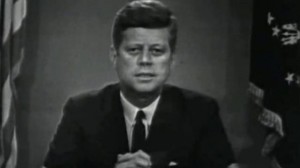In 1963, the public watched in horror as protesters in Alabama were attacked with fire hoses and police dogs. This was the same year thousands participated in the March on Washington where Rev. Dr. Martin Luther King, Jr. delivered his famous “I Have A Dream” speech. President John F. Kennedy broadcasted the historic Civil Rights Address — several months later he was assassinated. Betty Friedan’s The Feminine Mystique was published. Vietnam. The Beatles. Though arousing, these historical spotlights are hardly representative of either the experience of the time or their long-reaching effects. So, 50 years later, how do we observe this momentous year?
NPR’s Code Switch does more than simply reflect on, or honor, 1963. Through a new Twitter account, @TodayIn1963, it offers a chance to relive the news of the past through the media of today. Begun on Jun 6, @TodayIn1963 has been “live tweeting” the summer of 1963. Meaning they are simulating a “real time” play-by-play of events you might expect, from civil and human rights efforts to the politics and culture of the time. There is, of course, an overwhelming well to draw from. But this feed doesn’t just focus on the big headlines, main events or righteous historical outcomes, which is often the way the past is remembered. It embodies the fractured language of Twitter, today’s web and 24-hour media cycle to focus on the minutia of the past, not just what we’ve “learned” from it.
@TodayIn1963 isn’t your typical historical tribute project. There are no marble statues or intricate museum displays or big glossy black and white photographs we are accustomed to reading as the language of “observing the past.” In fact, the feed barely dips into the vast visual archive of this moment. There are, however, links to scanned newspaper articles from 1963 housed in Google News’ cavernous historical archive. This offers historical evidence or expanded information but is also a compelling and rupturing visual juxtaposition of media then and now.
Followers don’t just look at packaged historical remembrances. If you are a Twitter user, smattered among tweets from your best friend, the Huffington Post and, say, the Rock (a.k.a. Dwayne Johnson) are dispatches from history that don’t always appear as historical. Aug 28, 1963 was the famous March on Washington, and Aug 28, 2013 was by far one of the most tweet-ful days. Of course, tweets included are predictable relays such as quotes from King’s speech or JFK’s response. But also present are details about parking in downtown D.C., how to handle lost children, or celebrity spotting.
About 40,000 marchers have gathered at the Washington Monument, some posing for photos like tourists visiting the capital
— Today in 1963 (@TodayIn1963) August 28, 2013
Buses carrying marchers now leaving Yonkers, New York, for D.C.
— Today in 1963 (@TodayIn1963) August 28, 2013
This simulates a very different sort of remembrance. Code Switch was smart to use Twitter, exploiting its unceasing onslaught of “brevity en masse” that inherently interrupts and distracts itself, from itself. A random New York Times post will tease attention from your co-worker’s photo from lunch, which distracts from Kanye West’s current stream of ranting. And so it goes on. History is curated and relies on being presented as a completed thought, even if it’s not. We are taught to interpret it as a message, but not check its motivations. The history presented in @TodayIn1963 is undoubtedly and immediately disrupted, both because it reports on the play-by-play minutia of the event but also because the social media platform does not necessarily allow for a linear or cohesive message to unfold. The message is in the medium of Twitter itself.


